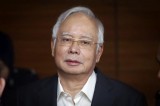Thailand eyes to be hub of trans-ASEAN railway network
The Thai government is pursuing an ambitious plan to build a rail network linking Thailand to other countries in the region, like Singapore and China.

Illustrative image. (Photo: VNA)
The government has already begun the construction of some routes and will keep calling bids for the project, according Thai Deputy Minister of Transport Pailin Chuchottaworn. Thai people will be able to take high-speed trains from a railway station in Bang Sue, Bangkok, to Beijing, China and Singapore in the future, he added.
That will be possible once the construction of four routes for Shinkansen is completed and the Bang Sue railway station will be a hub of the “Trans-ASEAN Line”.
Under the government’s plan to make Thailand the logistics hub of ASEAN, the high-speed trains will be at the heart of the country’s new infrastructure system. It will be the first time Thailand will have such a modern transport network, which will cover 3,193 kilometres at a cost of about 2.07 trillion THB (67.3 billion USD).
The rail route will link Bang Sue with Chiang Mai in the North, Laos in the Northeast, Cambodia in the East and Malaysia in the South.
The route will make transport more convenient and are expected to drive the national economy forward in the long term, the official noted.
The first route, a Thai-Sino project linking Bangkok and Nong Khai in the Northeast, is now under construction and scheduled to be completed by 2023. The 608-km line will serve as the main transport system to Laos, which is next to Nong Khai.
From the border line, another rail route will run to the Lao capital of Vientiane, and the last leg will take passengers to Mohan, a border town in Yunnan Province, China.
The Lao government is also in the process of building another rail section connecting its capital with Nong Khai.
Bang Sue will be a grand station, expected to be the largest in ASEAN, according to the plan. The four-storey station will cover an area of 300,000 square metres and is planned to be surrounded by commercial areas. The station will also be connected with Bangkok’s urban rail lines and rail routes to upcountry provinces.
Ratthaphum Parichatpricha, the chief engineer at the Engineering Institute of Thailand, said ASEAN can change from a user to a developer of the high-speed rail technology if the bloc continues to support rail transport and related businesses.
Thailand is preparing a new agreement on railway industry standards with Malaysia, Vietnam and Indonesia, as they are also spending a huge amount of money building various modes of train transport, from high-speed system to subways, he said.
VNA
 Malaysia, Singapore step up cooperation in environmental protection
Malaysia, Singapore step up cooperation in environmental protection
 Malaysia's digital economy projected to reach 31 billion USD in 2024
Malaysia's digital economy projected to reach 31 billion USD in 2024
 Opportunity to enhance the position of the Global South
Opportunity to enhance the position of the Global South
 Thailand to build new bridge to Cambodia
Thailand to build new bridge to Cambodia
 Bulgaria charts new course with Vietnam on President’s upcoming visit: Diplomat
Bulgaria charts new course with Vietnam on President’s upcoming visit: Diplomat
 Seminar seeks ways to boost ASEAN - Latin America connectivity
Seminar seeks ways to boost ASEAN - Latin America connectivity
 Indonesia seeks India's help in health education
Indonesia seeks India's help in health education
 Indonesia named world's most generous country in 2024
Indonesia named world's most generous country in 2024
 Philippines: Over-4m-high floodwaters make thousands of houses submerged
Philippines: Over-4m-high floodwaters make thousands of houses submerged
 Singapore’s public sector records carbon reduction in 2023
Singapore’s public sector records carbon reduction in 2023



